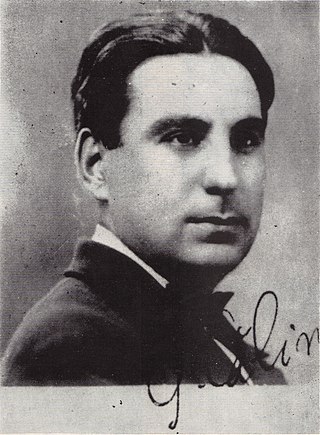
George Călinescu was a Romanian literary critic, historian, novelist, academician and journalist, and a writer of classicist and humanist tendencies. He is currently considered one of the most important Romanian literary critics of all time, alongside Titu Maiorescu and Eugen Lovinescu, and is one of the outstanding figures of Romanian literature in the 20th century.
Dan Duțescu was a professor of English language and literature at the University of Bucharest, and a member of the Romanian Writers' Union.

Ion Hobana, first name also Ioan, last name also Hobană was a Romanian science fiction writer, literary critic and ufologist. His debut as a journalist, novelist and children's poet coincided with the early stages of Romanian communism, when he was also employed as an editor and translator; at that stage, Hobana adhered to Marxism-Leninism and socialist realism, which influenced his literary output. His participation in the local field of science fiction began in during his period studying at the University of Bucharest, when he produced a pioneering paper on the work of Jules Verne. It continued in the late 1950s, with stories which focused on describing futuristic technology in a terrestrial setting. By the early 1960s, Hobana was also a critic and theorist of science fiction, producing a claim that Romanian science-fiction culture was a byproduct of communism. He revisited the thesis later that decade, producing award-winning essays about pre-modern science fiction, Romanian as well as foreign. He was also involved on the scene as an anthologist and film critic.
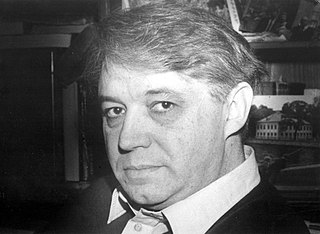
Nicolae Breban is a Romanian novelist and essayist of partial German descent.

Șerban Nicolae Foarță is a contemporary Romanian writer. A translator, essayist, playwright, prose writer and even illustrator, he is most widely known for his poetry books.
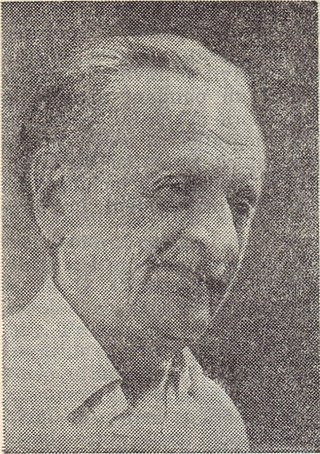
Șerban Cioculescu was a Romanian literary critic, literary historian and columnist who was born in Drobeta-Turnu Severin and died in Bucharest. He held teaching positions in Romanian literature at the University of Iași and the University of Bucharest, as well as membership of the Romanian Academy and chairmanship of its Library. Often described as one of the most representative Romanian critics of the interwar period, he took part in the cultural debates of the age, and, as a left-wing sympathizer who supported secularism, was involved in extended polemics with the traditionalist, far right and nationalist press venues. From early on in his career, Cioculescu was also noted for his selective approach to literary modernism and the avant-garde, preferring to place his cultural references with Neoclassicism.
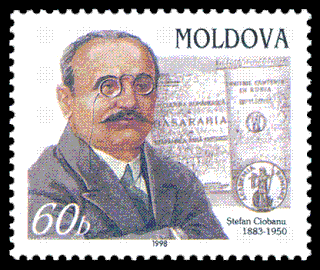
Ștefan Ciobanu was a Moldovan historian and academician, author of some important works about ancient Romanian literature, Romanian culture in Basarabia under Russian occupation, Bessarabian demography, fervent advocate of the introduction of the Romanian language in the schools of Bessarabia, vice-president of the Romanian Academy between 1944 and 1948. He served as Minister of Education (1917–1918) of the short-lived Moldavian Democratic Republic.

Ion Ciocanu was a Moldovan literary critic.
Traian T. Coșovei was a Romanian poet. He was a member of the Writers' Union of Romania.

Ovid S. Crohmălniceanu was a Romanian literary critic and science fiction writer.
Virgil Mazilescu was a Romanian poet, essayist and translator.
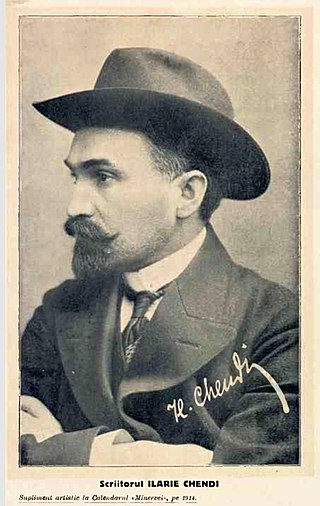
Ilarie Chendi was a Romanian literary critic.

Sami Damian (sometimes referred to as S. Damian or Samy Damian was a Romanian-born Jewish literary critic and essayist.

Gheorghe Adamescu was a Romanian literary historian and bibliographer.
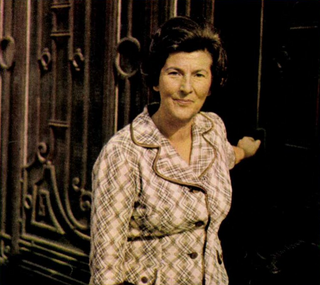
Zoe Dumitrescu-Bușulenga was a Romanian comparatist and essayist. A native of the national capital Bucharest, she was educated at its main university and went on to become a professor there. Together with a focus on interdisciplinary studies, she devoted several studies to Mihai Eminescu. Dumitrescu was also a dignitary of the Romanian Communist Party. Following the Romanian Revolution, she lived in Rome for several years, then retired to a monastery.
Nicolae G. Rădulescu-Niger was a Romanian prose writer, playwright and poet.

Aurel Mihale was a Romanian prose writer.

Laszlo Alexandru is a Romanian essayist, literary critic, literary historian, translator and journalist. He is an Italian teacher. He is editor of E-Leonardo cultural magazine and coordinator of the Italian collection at the "Ecou Transilvan" Publishing House. He is known for his Dante interpretation contributions in the university field in Romania and in Europe, in the Romanian culture and in the Italian culture. Also known in Israel for his cultural studies on the Holocaust. Since 2014, he is a member of the Romanian Writers' Union. His books have been published in Romania and in the Republic of Moldova. He won the Romanian Writers' 2020 Special Award for Lectura lui Dante. Infernul; Purgatoriul; Paradisul. Knight (Cavaliere) of the Order of the Star of Italy by decree of the President of the Republic, on the recommendation of the Minister of the Foreign Affairs.

Mihai or Mihail Gafița was a Romanian literary historian, critic, editor, and children's novelist, also noted as a communist activist and politician. He began his career during World War II, with pieces published in a youth magazine put out by Universul. During his time studying at the University of Bucharest, he became involved in left-wing agitation, joining the National Popular Party and serving as chairman of its youth sections, as well as of the National Union of Romanian Students. Having been embraced by the Romanian Communist Party, Gafița emerged as one of its interpreters of Romanian literature, and excelled in particular as a writers' biographer. The late 1940s saw him espousing Socialist Realism, with noted fanaticism in public, but also working to reinstate disgraced authors such as Ion Vinea. He was controversially involved with coaxing the acclaimed writer Cezar Petrescu, converting him to communism and encouraging him to rewrite his novels on Socialist-Realist manner; Gafița also joined the ranks of communist censors by bracketing out thousands of pages from Petrescu's last novel.

Daniel Lăcătuș is a Romanian journalist, poet, and prose writer. In 2011, he became a member of the Writers' Union of Romania, Sibiu branch.















